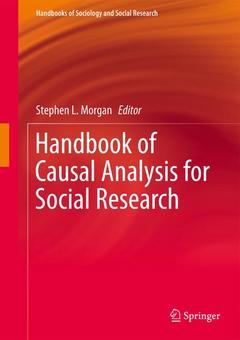Description
Handbook of Causal Analysis for Social Research, 2013
Handbooks of Sociology and Social Research Series
Coordinator: Morgan Stephen L.
Language: English
Keywords
Causal Analysis in the Social Sciences; Causal inference; Causality and Structural Equation Models; Cause-effect; Counterfactuals Causal Analysis; Hybrid Models for Causal Analysis; Partial Identification; Research Design; Social Networks; Sociological Methodology; Using Directed Acyclic Graphs (DAGs)
Publication date: 08-2014
424 p. · 17.8x25.4 cm · Paperback
Publication date: 05-2013
424 p. · 17.8x25.4 cm · Hardback
Description
/li>Contents
/li>Biography
/li>Comment
/li>
What constitutes a causal explanation, and must an explanation be causal? What warrants a causal inference, as opposed to a descriptive regularity? What techniques are available to detect when causal effects are present, and when can these techniques be used to identify the relative importance of these effects? What complications do the interactions of individuals create for these techniques? When can mixed methods of analysis be used to deepen causal accounts? Must causal claims include generative mechanisms, and how effective are empirical methods designed to discover them? The Handbook of Causal Analysis for Social Research tackles these questions with nineteen chapters from leading scholars in sociology, statistics, public health, computer science, and human development.
Preface.- Chapter 1. Introduction; Stephen L. Morgan.- PART I. BACKGROUND AND APPROACHES TO ANALYSIS.- Chapter 2. A History of Causal Analysis in the Social Sciences; Sondra N. Barringer, Erin Leahey and Scott R. Eliason.- Chapter 3. Types of Causes; Jeremy Freese and J. Alex Kevern.- PART II. DESIGN AND MODELING CHOICES.- Chapter 4. Research Design: Toward a Realistic Role for Causal Analysis; Herbert L. Smith.- Chapter 5. Causal Models and Counterfactuals; James Mahoney, Gary Goertz and Charles C. Ragin.- Chapter 6. Mixed Models and Counterfactuals; David J. Harding and Kristin S. Seefeldt.- PART III. BEYOND CONVENTIONAL REGRESSION MODELS.- Chapter 7. Fixed Effects, Random Effects, and Hybrid Models for Causal Analysis; Glenn Firebaugh, Cody Warner, and Michael Massoglia.- Chapter 8. Heteroscedastic Regression Models for the Systematic Analysis of Residual Variance; Hui Zheng, Yang Yang and Kenneth C. Land.- Chapter 9. Group Differences in Generalized Linear Models; Tim F. Liao.- Chapter 10. Counterfactual Causal Analysis and Non-Linear Probability Models; Richard Breen and Kristian Bernt Karlson.- Chapter 11. Causal Effect Heterogeneity; Jennie E. Brand and Juli Simon Thomas.- Chapter12. New Perspectives on Causal Mediation Analysis; Xiaolu Wang and Michael E. Sobel.- PART IV. SYSTEMS AND CAUSAL RELATIONSHIPS.- Chapter 13. Graphical Causal Models; Felix Elwert.- Chapter 14. The Causal Implications of Mechanistic Thinking: Identification Using Directed Acyclic Graphs (DAGs); Carly R. Knight and Christopher Winship.- Chapter 15. Eight Myths about Causality and Structural Equation Models; Kenneth A. Bollen and Judea Pearl.- PART V. INFLUENCE AND INTERFERENCE.- Chapter 16. Heterogeneous Agents, Social Interactions, and Causal Inference; Guanglei Hong and Stephen W. Raudenbush.- Chapter 17. Social Networks and Causal Inference; Tyler J. VanderWeele and Weihua An.- PART VI. RETREAT FROM EFFECT IDENTIFICATION.- Chapter 18. Partial Identification and Sensitivity Analysis; Markus Gangl.- Chapter 19. What You can Learn from Wrong Causal Models; Richard Berk, Lawrence Brown, Edward George, Emil Pitkin, Mikhail Traskin, Kai Zhang and Linda Zhao.-
Addresses the main debates in the methodology of social inquiry
Offers overview material on causal inference and covers many central issues in the identification of systems of causal relationships
Brings together leading scholars in Sociology, Statistics, Public Health, Computer Science and Human Development
These books may interest you

Causation, Evidence, and Inference 178.41 €



